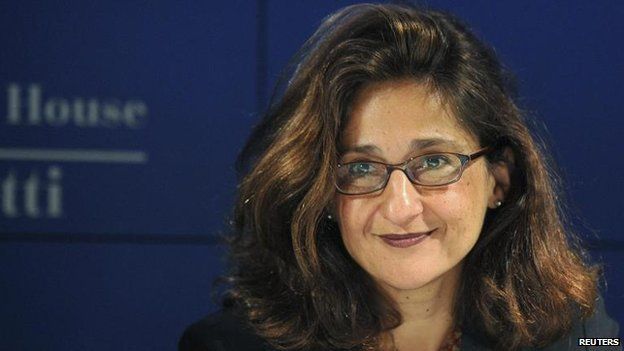All change at the Bank of England
- Published
- comments

Bloomin' 'eck there is a bewildering game of musical chairs going on at the Bank of England this morning. And pretty much every big job there, bar the very top one, is changing in some way.
I will summarise what I see as the main events.
For the second time in its history, the Bank of England has appointed a woman to a top policy job, as Minouche Shafik takes the newly created post of deputy governor responsible for markets and banking (Rachel Lomax was the first female deputy governor, a few years back).
What's most interesting about the Shafik appointment - other than its gender (the Bank has been such a boys' club) - is how the governor, Mark Carney, has raided the responsibilities of three other big jobs to carve out the role.
She'll take the seat on the Monetary Policy Committee currently occupied by Paul Fisher, the bank's executive director for markets (who looks likes the main loser from this reorganisation).
And she will also assume chunky duties from the other two deputy governors, those for monetary policy and financial stability - namely that she will be the main negotiator with the G7 group of leading economies and the IMF (currently a monetary policy responsibility), and with overseas central banks and the Bank for International Settlements (nicked from financial stability).
But what was most interesting about the description of her job was this: "Dr Shafik will be responsible for reshaping the Bank's operations and balance sheet, including robust risk management practices and helping to lead the design and execution of an eventual exit from quantitative easing by the Monetary Policy Committee".
In other words, as and when the Bank of England starts to offload that £375bn of government debt it bought, in its unprecedented exercise to create new money and keep interest rates at record lows after the crash, she'll be responsible for preventing a collapse in the price of that debt that could hobble both the Bank of England and commercial banks.
No stress there then.
And although she is a very high powered person, as deputy managing director of the IMF since April 2011 and prior to that permanent secretary at the Department for International Development, the cut and thrust of markets will be new to her.
What else is happening in Threadneedle Street?
Well another Goldman Sachs alumnus rises to the top of the Bank to join Mr Carney - with the appointment of Ben Broadbent to replace Charlie Bean as deputy governor for monetary policy.
Broadbent was already on the Bank of England's interest-rate-setting Monetary Policy Committee, but before that he was Goldman's senior European economist.
In practice Broadbent becomes the top economist at the Bank. But there is also a change in the holder of what the Bank calls its chief economist post, with Andy Haldane taking that job.
Haldane is in fact doing a job swap, with his exact Bank of England contemporary Spencer Dale (I think they joined on the same day as young graduates).
So Dale takes Haldane's job as executive director for financial stability.
It is certainly interesting that Haldane is staying at the Bank, because it was widely felt that his relations with Mr Carney are poor - since Haldane's ideas on how to cleanse and stabilise the banking system were rather more radical than Mr Carney's.
And Mr Haldane - regarded as one of the more creative and insightful economists of his generation - has been unwontedly quiet on the City reform agenda in recent months.
Finally one of the more distinguished of the UK's industrialists, Anthony Habgood, will replace Sir David Lees as chair of the Court of the Bank of England (the Bank's pompous historic name for its board).
He has the job of making sure Mr Carney - with all the many new responsibilities he's been given by the chancellor, for making sure the financial system and banks don't fall over again - doesn't go power mad.
Mr Carney himself will lay out his own cunning plan to knit together the newly huge and amorphous Bank of England in the Mais Lecture, later today.
And although you may feel a wave of torpor sweeping over you, at just the thought of a speech about governance and structure at the Bank, it may be sensible to stay awake.
Because how the Bank of England executes its complicated mandate, of keeping inflation low and financial stability high, affects the prosperity of us all.
UPDATE 15:40
Inside the Bank of England, the scale of the personnel changes is causing a tiny bit of internal handwringing, as one or two backs are perhaps put out.
So here is a little ouch from one of its people: "Minouche won't be the lead international person on everything. For example, on the international financial reform programme, Jon Cunliffe [the current deputy governor of financial stability] will take the lead in G20 and Financial Stability Board.
"Jon will also be on the board of the Bank for International Settlements. It's a detail, but an important one."
Of course.
And as for the apparent demotion to Paul Fisher, it may be that his job has been downgraded rather than the bloke himself - if you catch my drift. We shall see.